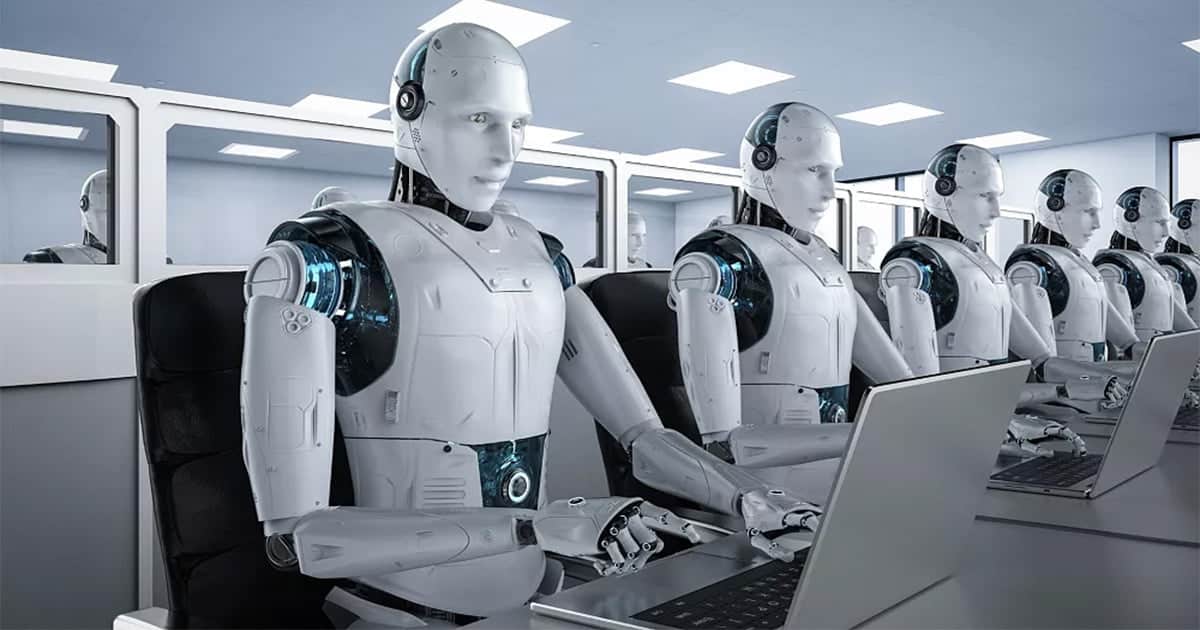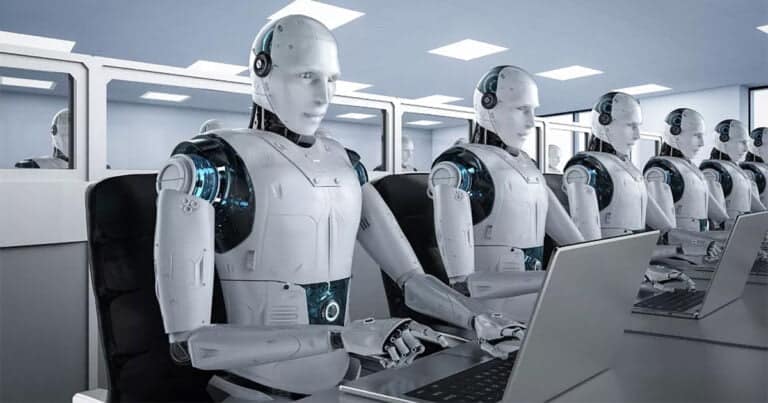AI in the Workplace: Artificial intelligence (AI) is rapidly reshaping the landscape of the workplace. It is both automating routine tasks and birthing new possibilities for employees. The ubiquitous presence of AI in various industries is a testament to its transformative power. In this article, we’ll delve into the realm of AI in the workplace and explore how it’s changing the future of jobs and automation.
How AI is Changing the Workplace
AI’s impact on the workplace is profound and multifaceted. From mundane data entry to intricate medical diagnoses, artificial intelligence is taking on a wide range of responsibilities. Let’s look at some examples:
Customer Service Reinvented
AI-driven chatbots are now the first point of contact for many businesses. They handle customer inquiries efficiently, providing immediate solutions and support. This not only enhances customer service but also allows human employees to focus on more complex issues.
Automating Complex Tasks
In addition to customer service, AI is automating intricate tasks. From accounting to legal research and even medical diagnoses, AI-powered software is streamlining operations and increasing accuracy.
AI-Powered Assistants
Virtual assistants like Siri and Alexa are increasingly prevalent in our lives. They help us manage our schedules, fetch information, and control smart devices. This is just the tip of the iceberg as AI continues to evolve and provide more innovative solutions.
Pioneering New Products and Services
AI’s impact isn’t limited to existing tasks. It is a catalyst for innovation, driving the creation of new products and services. From cutting-edge medical treatments to innovative financial products, AI is at the forefront of pioneering advancements.
The Impact of AI on Jobs
The relationship between AI and jobs is a subject of intense debate. Some experts predict widespread job displacement as AI gains the capacity to perform tasks currently done by humans. On the contrary, others foresee AI creating more jobs than it eliminates, ushering in new industries and novel products and services.
The reality likely lies somewhere in between. Some jobs, particularly those involving routine tasks, are vulnerable to automation. Yet, “AI in the Workplace” also generates new job opportunities and transforms the nature of existing roles. As routine tasks get automated, workers can dedicate more time to creative and strategic responsibilities.
How to Prepare for the Future of Work
As AI becomes a permanent fixture in the workplace, individuals must adapt to thrive. Here are some skills and strategies to consider:
1. Creativity and Problem-Solving
AI excels at routine tasks, but it struggles with creativity and complex problem-solving. Developing these skills will make you an invaluable asset in the workplace.
2. Critical Thinking and Analysis
Enhance your critical thinking and analytical skills. AI can provide data, but it’s up to humans to interpret it effectively.
3. Communication and Collaboration
While AI can assist in communication, the art of effective human interaction remains essential in the workplace.
4. Adaptability and Lifelong Learning
The workplace is evolving rapidly. Adaptability and a commitment to lifelong learning will ensure you stay ahead of the curve.
Stay informed about the latest AI trends and technologies. This knowledge equips you to identify new opportunities and be ready for the transformations that lie ahead.
Examples of AI in the Workplace
Let’s look at some real-world examples of AI’s role in different industries:
Customer Service
Cleo, an AI-driven chatbot, helps customers track their spending and manage their finances, offering personalized financial advice.
Healthcare
AI is being used to develop groundbreaking medical treatments and assist in diagnosing diseases. AI-powered software aids doctors in identifying cancer cells in medical images.
Manufacturing
In the manufacturing sector, “AI in the Workplace” is streamlining tasks such as assembly and quality control. AI-powered robots now assemble cars on factory floors, ensuring precision and efficiency.
Transportation
AI is at the forefront of “AI in the Workplace,” self-driving vehicle development, and traffic optimization. Companies like Waymo are paving the way for autonomous transportation, improving efficiency and safety.
Conclusion
“AI in the Workplace” is a transformative force in the workplace. It can be both a threat and an opportunity. To ensure success in the future of work, focus on developing skills that complement AI, stay abreast of AI trends, and embrace change with adaptability. The future of work is evolving, and it’s up to individuals to navigate this exciting journey with enthusiasm and preparedness.
FAQs
1. How is AI changing the job market?
AI is automating routine tasks, which could lead to job displacement in some areas. However, it’s also creating new job opportunities and changing the nature of existing roles.
2. What skills are essential for the future of work in the age of AI?
Skills such as creativity, critical thinking, adaptability, and communication will be invaluable in a workplace dominated by AI.
3. Are there risks associated with AI in the workplace?
Yes, there are concerns about job displacement and the need for reskilling. However, with the right approach, these challenges can be turned into opportunities.
4. How can businesses harness the power of AI in their operations?
Businesses can leverage AI to streamline operations, enhance customer service, and drive innovation in product and service development.
5. What’s the role of AI in healthcare?
AI plays a pivotal role in healthcare, from diagnosing diseases to developing new treatments. It enhances medical professionals’ capabilities and improves patient outcomes.
Image Source: euronews
The Power of AI for Businesses




